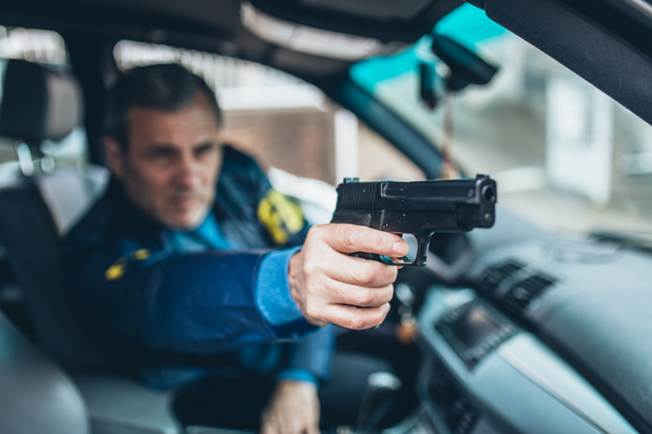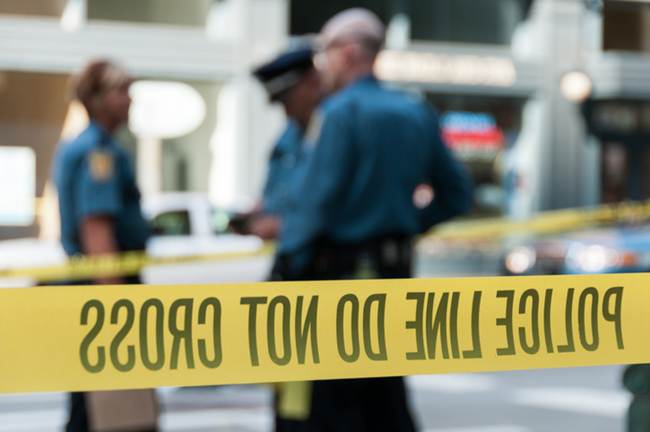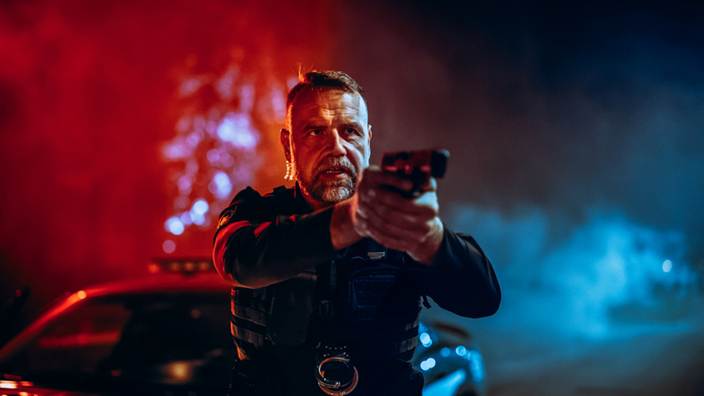
New York Wrongful Police Shooting Attorneys
One Moment Changed Everything, Now What?
When a police shooting takes a life, the shock can be paralyzing. One second, everything felt normal. The next, your world collapsed. You may feel overwhelmed by grief, blinded by anger, or stuck in silence. Every reaction is valid, because no one is ever prepared for this.
In the hours and days that follow, the pain deepens. You want answers, but the system moves slowly. Sometimes, it doesn’t move at all. That’s when families begin to realize something more has to be done. Legal action might be the only path forward. Not because it erases what happened, but because it shines a light on the truth, and forces change.
If you need a legal team that understands how personal and painful these situations are, Horn Wright, LLP, is here to help. We represent families across New York who are seeking justice after wrongful police shootings. Our attorneys handle every step of the process with compassion, urgency, and a fierce dedication to accountability.

What Counts as a Wrongful Police Shooting?
A wrongful police shooting isn’t about whether a gun was fired. It’s about whether deadly force was legally and morally justified. When officers shoot someone without a clear, immediate threat, that shooting may cross the line.
Some patterns keep showing up in these cases:
- The person was unarmed
- They were running away
- They were mistaken for someone else
- Racial profiling played a role
Wrongful shootings happen in homes, on sidewalks, during traffic stops, and even inside schools. The details vary, but the central question is always the same: Was deadly force necessary at that moment? Often, a closer look reveals that officers had safer alternatives.
Who Can Be Held Accountable: It’s Not Just One Officer
Accountability doesn’t end with the person who pulled the trigger. In many cases, wrongful shootings point to systemic failures:
- Supervisors who ignored prior complaints
- Departments that failed to train officers properly
- Cities that protect misconduct with red tape
- Officers who stood by and did nothing
Each of these players can carry legal responsibility. When a shooting happens, it often reflects years of neglected warning signs. Holding multiple parties accountable can lead to broader reforms that prevent future tragedies. It also sends a clear message that misconduct won’t be quietly buried under bureaucracy.
What the Law Says About Deadly Force in New York
Under New York law, police can only use deadly force in very limited situations. Specifically:
- NY Penal Law §35.15 allows force only when a person faces an immediate threat of serious injury or death.
- NY Penal Law §35.30 applies these standards to law enforcement officers.
At the federal level, courts use the "objective reasonableness" test. That means an officer’s use of force must be reasonable from the perspective of another officer in the same moment.
Courts also weigh whether the officer tried other options before using deadly force. If they didn't, and there were safer alternatives, their actions may not meet the threshold for justification. The legal standards governing police use of deadly force set a high bar because the consequences are permanent.
What Makes a Police Shooting “Unjustified”
A shooting may be considered unjustified if the person was:
- Unarmed and not acting aggressively
- Trying to surrender or already restrained
- Fleeing with no sign of being a threat
Officers are supposed to follow a use-of-force continuum. That means escalating force only when absolutely necessary. If an officer skips steps or ignores non-lethal options, their actions may be unlawful.
In many cases, the failure to communicate or de-escalate makes all the difference. Unjustified shootings usually come down to choices officers made in those critical seconds.
What Evidence You’ll Need to Build a Strong Case
Strong evidence can make all the difference in a wrongful shooting claim. These are some of the most important pieces:
- Video footage: Body cams, dash cams, security cameras
- Forensics: Autopsy reports, bullet trajectories, and gunshot residue tests
- Eyewitness statements: Especially from neutral bystanders
- Radio and dispatch audio: Officer statements before and after the event
- Department records: Internal policies and past complaints against the officer
Your legal team can issue subpoenas and work with experts to prove liability in wrongful police shootings. The sooner that process begins, the more likely it is that key pieces won’t be lost or overwritten.

What Families Can Recover in a Wrongful Shooting Claim
While no amount of money can fix what’s been taken, the law does allow families to recover damages, including:
- Economic: Medical bills, funeral expenses, and lost future earnings
- Non-economic: Emotional pain, grief, and trauma
- Punitive damages: When an officer’s actions show reckless disregard
- Reforms: Some lawsuits lead to policy changes and officer retraining
These cases aren’t just about compensation. They’re about forcing change so no other family suffers the same fate. They can also create a public record that pushes departments to do better. Wrongful death claims bring stability to families shattered by loss, while reforms can bring meaning to a tragedy.
Civil vs. Criminal: Two Legal Paths to Justice
There are two ways to hold officers accountable: civil lawsuits and criminal prosecution.
Criminal cases are handled by the District Attorney or the NY Attorney General’s Office of Special Investigation. These cases can lead to jail time, but convictions are rare.
Civil cases are brought by families. They aim for accountability and financial recovery.
Even when criminal charges aren’t filed, civil cases in wrongful police shootings can expose misconduct and apply pressure where it matters. Families can pursue both paths at the same time.
What Happens During a Police Shooting Investigation
After a police shooting, an investigation usually begins. But that doesn’t mean answers come quickly.
- The department may launch an internal review.
- The District Attorney or OSI may examine the case.
- In NYC, the Civilian Complaint Review Board may get involved.
These investigations can take months, and families are often left in the dark. Filing a civil claim is sometimes the only way to access key evidence and force transparency. Without legal pressure, important questions may never get answered.
Qualified Immunity and the Legal Shields That Protect Officers
Qualified immunity is a legal defense that protects officers from being sued unless they violate “clearly established” rights.
It’s a major hurdle, but not impossible to overcome. When the facts show a clear abuse of power, courts can deny immunity. Experienced attorneys know how to hold officers accountable for wrongful shootings.
Sometimes, public pressure and strong documentation make it harder for immunity to apply. The more clear-cut the violation, the less protection officers have under this rule.
How to File a Lawsuit for a Wrongful Police Shooting
Families can bring both federal and state claims:
- Federal claims under 42 U.S. Code § 1983 address violations of constitutional rights
- State claims may include wrongful death, excessive force, and false imprisonment
Who can file?
- Spouses
- Children
- Parents
- Estate representatives
- Financial dependents
Each case starts with a clear filing strategy. Filing a wrongful police shooting lawsuit takes coordination, legal insight, and deep understanding of what the family has gone through.
The 90-Day Rule and Other Deadlines You Can’t Miss
Time limits are strict in police shooting cases. Missing a deadline can mean losing your chance to file.
- Notice of claim: must be filed within 90 days
- Wrongful death claims: 2 years
- Civil rights claims: 3 years from the incident
Acting quickly helps preserve crucial evidence. These steps families can take after a wrongful police shooting can make a major difference.

Wrongful Shootings During No-Knock Raids or Search Warrants
Unannounced police raids carry serious risk. When officers enter without warning, mistakes happen.
Some of the biggest dangers:
- Wrong addresses
- Mistaken identity
- Excessive force in confusion
If a search warrant is illegal or poorly executed, victims can sue for violations of their rights. Wrongful police shootings during search warrants raise serious questions about oversight and judgment.
When Victims Survive, But Everything Still Changes
Not every wrongful shooting ends in death. Survivors may live with permanent scars, both physical and emotional.
Many face:
- Long-term medical problems
- PTSD and psychological trauma
- False arrests or ongoing charges
Even if the person survives, they still have the right to bring a civil rights lawsuit. Survivors often deal with surgeries, job loss, and emotional distress for years. Wrongful shootings of juveniles and minors and other vulnerable groups highlight how devastating these cases can be.
Wrongful Death Claims After Police Shootings
When a life is lost, families can file a wrongful death claim. This type of lawsuit focuses on both financial loss and emotional impact.
Families may recover for:
- Lost income and support
- Funeral expenses
- Loss of companionship and guidance
It’s a path toward justice, even in the middle of unimaginable loss. These claims also help expose harmful practices. Families often take action not just for themselves, but to prevent other families from suffering the same way. Community impact of wrongful police shootings makes these cases larger than any single tragedy.
When Innocent Bystanders Get Hurt
Police shootings sometimes injure or kill people who had nothing to do with the incident. In these cases, victims have rights too.
These shootings happen when:
- Officers fire into crowds
- They mistake bystanders for suspects
- Bullets go astray in chaotic scenes
Proving negligence or reckless conduct is key. With the right evidence, wrongful police shootings involving bystanders that result in successful lawsuits will eventually lead to accountability.
Media Pressure and Public Scrutiny: How to Protect Your Story
After a police shooting, the media can swarm. Reporters call, headlines spread, and social media fills with speculation.
In moments like these, silence can be a powerful choice. Speaking publicly too soon can complicate legal efforts. That’s why many families work with attorneys to manage media attention in wrongful shooting cases.
What Happens When Departments Ignore De-Escalation
Many wrongful shootings could have been avoided if officers used de-escalation tactics.
Too often, departments:
- Fail to train officers properly
- Ignore policy guidelines
- Create a culture of aggression
The absence of training speaks volumes in court. Departments that fail to enforce rules often create environments where avoidable tragedies happen.
The System Is Slow, But Legal Pressure Moves It
Lawsuits don’t just seek justice for one family. They can drive reform for entire communities.
We’ve seen cases lead to:
- Public settlements that uncover misconduct
- Injunctions forcing retraining
- Policy changes that save lives
Even if the wheels of justice turn slowly, civil rights lawsuits after wrongful police shootings can still bring real momentum.
Horn Wright, LLP, Represents Families Across New York in Police Shooting Cases
At Horn Wright, LLP, we know how heavy this burden feels. Losing someone to a police shooting is more than a legal matter. Our attorneys represent families across New York, from Buffalo to Brooklyn, and in neighboring states like Vermont, New Hampshire, and Maine. We approach every case with compassion, strategy, and unwavering dedication.
If you need someone who truly understands what’s at stake, we’re ready to stand with you. Choosing an experienced lawyer for wrongful police shooting cases is one of the most important steps families can take.
Contact our offices today for a FREE consultation.

What Sets Us Apart From The Rest?
Horn Wright, LLP is here to help you get the results you need with a team you can trust.
-
Client-Focused ApproachWe’re a client-centered, results-oriented firm. When you work with us, you can have confidence we’ll put your best interests at the forefront of your case – it’s that simple.
-
Creative & Innovative Solutions
No two cases are the same, and neither are their solutions. Our attorneys provide creative points of view to yield exemplary results.
-
Experienced Attorneys
We have a team of trusted and respected attorneys to ensure your case is matched with the best attorney possible.
-
Driven By Justice
The core of our legal practice is our commitment to obtaining justice for those who have been wronged and need a powerful voice.

